plant-based diet food list pdf
A plant-based diet focuses on whole, minimally processed foods like fruits, vegetables, whole grains, and legumes, offering numerous health benefits and environmental advantages. This guide provides a comprehensive food list PDF to help you transition smoothly to a balanced and sustainable plant-based lifestyle.
What is a Plant-Based Diet?
A plant-based diet prioritizes whole, minimally processed foods derived from plants, such as fruits, vegetables, whole grains, legumes, nuts, and seeds. It emphasizes natural ingredients over highly processed products, promoting a balanced and sustainable eating pattern. While some versions may include small amounts of dairy or eggs, others, like vegan diets, exclude all animal-derived foods. The focus is on nutrient-dense, whole foods that support overall health and well-being, making it a flexible and adaptable dietary approach for various lifestyles and preferences.
Benefits of a Plant-Based Diet
A plant-based diet offers numerous health benefits, including reducing the risk of heart disease, type 2 diabetes, and certain cancers. It promotes weight management, improves gut health, and supports overall well-being. By focusing on whole, unprocessed foods, this diet helps lower cholesterol and blood pressure, enhancing cardiovascular health. Additionally, plant-based eating contributes to environmental sustainability by reducing greenhouse gas emissions and conserving resources. It encourages a balanced intake of essential nutrients like fiber, vitamins, and minerals, fostering a healthier lifestyle and potentially reversing chronic conditions. This dietary approach is both nourishing and eco-friendly.
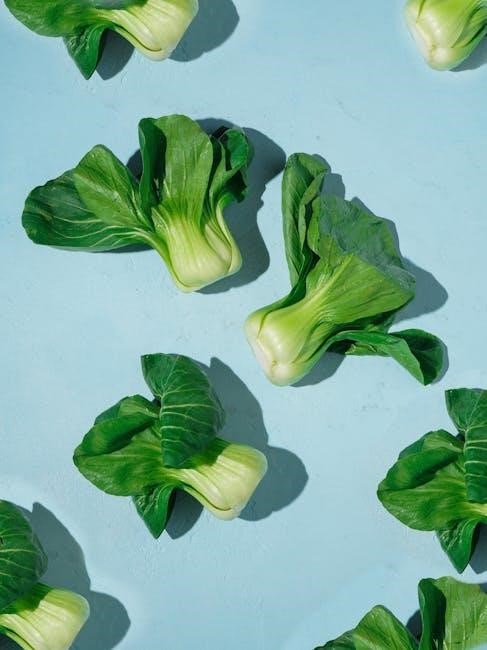
Core Components of a Plant-Based Diet
Plant-based diets emphasize whole, minimally processed foods like fruits, vegetables, whole grains, plant-based proteins, nuts, and seeds, providing essential nutrients for a balanced and healthy lifestyle.
Fruits
Fruits are a cornerstone of a plant-based diet, offering essential vitamins, minerals, and antioxidants. They are versatile and can be enjoyed fresh, in smoothies, or as snacks. Popular choices include berries, citrus fruits, apples, bananas, and tropical options like mangoes and pineapples. Fruits provide natural sweetness and fiber, supporting healthy digestion and energy levels. Incorporating a variety ensures a broad range of nutrients, making them a delicious and nutritious addition to any meal. They are also budget-friendly and widely available, making them an accessible choice for those adopting a plant-based lifestyle.
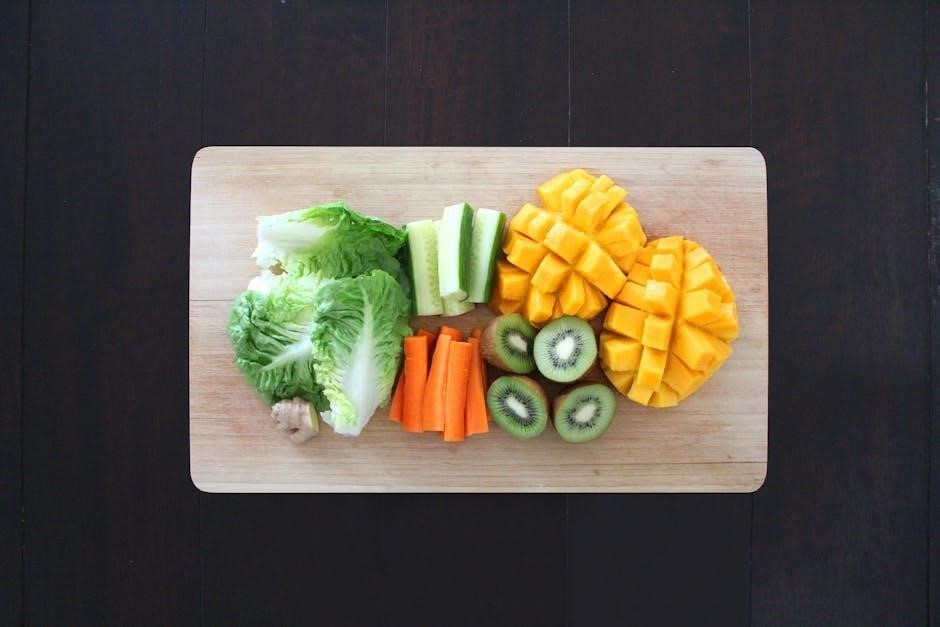
Vegetables
Vegetables are a foundational component of a plant-based diet, providing essential nutrients, fiber, and antioxidants. They come in a variety of colors, textures, and flavors, offering versatility in meals. Leafy greens like spinach, kale, and broccoli are rich in vitamins and minerals, while root vegetables such as carrots, sweet potatoes, and beets provide sustained energy. Cruciferous vegetables like cauliflower and Brussels sprouts support detoxification and immune function. Including a wide range of vegetables ensures a balanced intake of nutrients, promoting overall health and reducing the risk of chronic diseases. They are also cost-effective and can be prepared in countless ways, making them a convenient and nutritious choice for any meal or snack.
Whole Grains
Whole grains are a vital part of a plant-based diet, offering essential nutrients, fiber, and energy. They include foods like quinoa, brown rice, oats, and whole wheat bread, which are rich in vitamins, minerals, and antioxidants. Whole grains support heart health, digestion, and blood sugar regulation. They provide sustained energy and are versatile in meal preparation, from breakfast porridges to hearty salads. Incorporating whole grains ensures a balanced intake of complex carbohydrates and fiber, making them a cornerstone of a nutritious and satisfying plant-based lifestyle. They are also budget-friendly and widely available, making them an accessible choice for everyone.
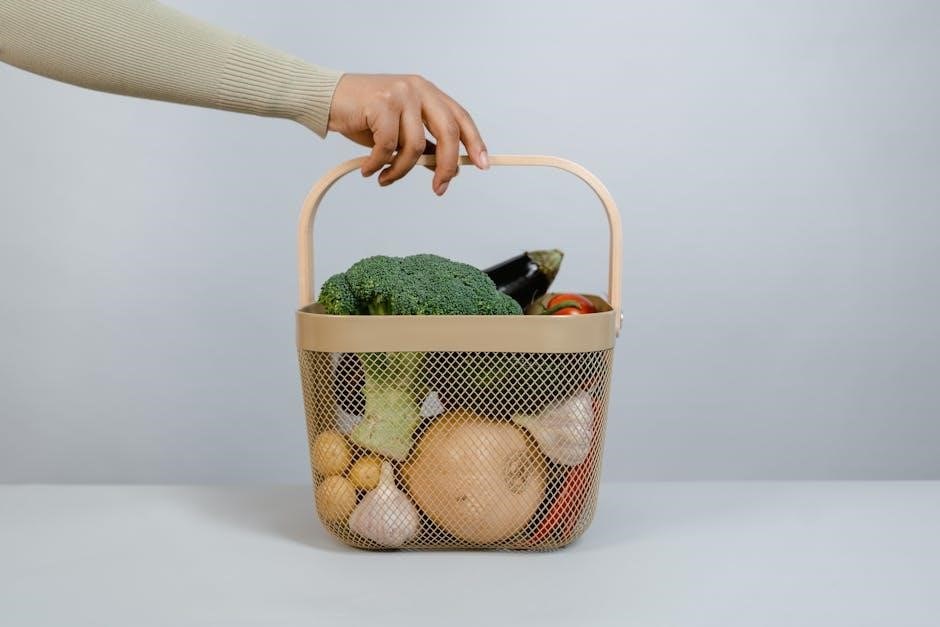
Plant-Based Proteins
Plant-based proteins are essential for a balanced diet, providing amino acids and fiber. Common sources include beans (black, kidney, chickpeas), lentils, tofu, tempeh, and edamame. These foods are versatile and nutrient-rich, supporting heart health and reducing chronic disease risks. They are also eco-friendly and budget-friendly, making them a sustainable choice. Incorporating plant-based proteins into meals, such as stir-fries, salads, or bowls, ensures variety and nutrition. They are a cornerstone of a healthy, plant-based lifestyle, offering numerous health benefits and culinary flexibility.
Nuts and Seeds
Nuts and seeds are nutrient-dense additions to a plant-based diet, providing healthy fats, protein, and fiber. Popular choices include almonds, chia seeds, flaxseeds, walnuts, sunflower seeds, pumpkin seeds, cashews, pistachios, hemp seeds, and sesame seeds. They are rich in vitamins, minerals, and antioxidants, supporting heart health and satiety. Use them as snacks, in recipes, or as toppings for meals. Opt for unsalted and unsweetened varieties to avoid added sugars and sodium. Moderation is key due to their calorie density, but they add flavor and texture to plant-based dishes while supporting overall well-being.
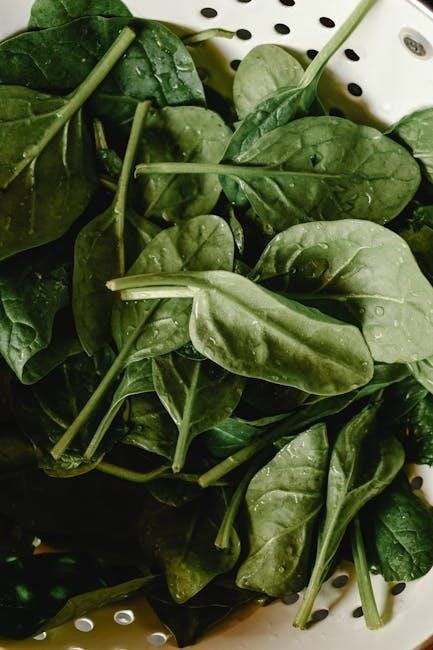
Grocery Shopping Tips for a Plant-Based Diet
Plan meals, buy frozen or discounted produce, and use a printable list. Stock essentials like whole grains and legumes, and opt for affordable, versatile ingredients.
Essential Items to Stock
Stocking your pantry with essential items is crucial for a successful plant-based diet. Start with whole grains like brown rice, quinoa, and oats. Legumes such as lentils, chickpeas, and black beans are versatile and nutritious. Nuts and seeds, including almonds, chia seeds, and flaxseeds, provide healthy fats and protein. Fresh and frozen fruits and vegetables are must-haves, as they add variety and nutrients to meals. Plant-based milk like almond, soy, and oat milk are great alternatives to dairy. Don’t forget herbs and spices to enhance flavors, and consider whole grain bread and tortillas for convenient options. Additionally, items like hummus, tofu, and tempeh can be staples for quick and tasty recipes. By keeping these essentials on hand, you can create a wide range of delicious and balanced plant-based dishes. Always check labels to ensure products align with your dietary preferences and avoid added preservatives or animal by-products. Using a printable grocery list can help you stay organized and ensure you never run out of your favorites. This approach not only makes meal planning easier but also supports a sustainable and healthy lifestyle.
Tips for Budget-Friendly Shopping
Adopting a plant-based diet doesn’t have to break the bank. Start by planning meals and creating a grocery list to avoid impulse buys. Opt for frozen fruits and vegetables, which are often cheaper and have a longer shelf life. Purchase whole grains, beans, and lentils in bulk, as they are cost-effective and versatile. Consider substituting expensive nuts with more affordable options like peanut butter or seeds; Shop for seasonal produce, as it tends to be cheaper and fresher. Use herbs and spices to add flavor instead of relying on costly sauces. Buying in bulk and utilizing coupons can also help reduce expenses; Finally, check store flyers for sales and stock up on non-perishable items to maximize savings.
Meal Planning and Preparation
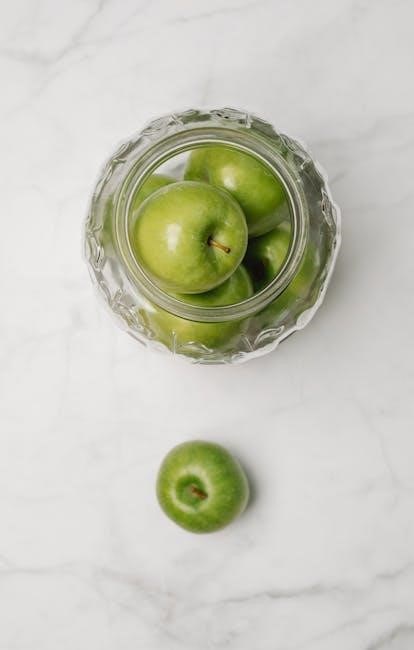
Meal planning is essential for a smooth transition to a plant-based diet. Use your grocery list to create balanced meals, ensuring variety and nutrition. The downloadable PDF guide offers structured meal ideas and organization tips, helping you stay on track with easy and nutritious plant-based recipes.
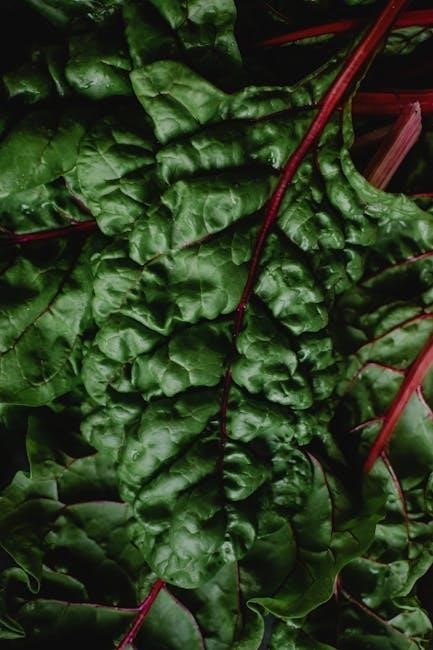
Sample Plant-Based Meal Ideas
Start your day with a hearty bowl of overnight oats or a vibrant smoothie. For lunch, try a quinoa salad with roasted vegetables or a lentil soup. Dinner options include stir-fried tofu with mixed veggies and brown rice or a hearty veggie burger. Snack on fresh fruits, trail mix, or hummus with veggie sticks. Explore global flavors like chickpea curries or vegan pasta dishes. These ideas, along with the downloadable PDF guide, will inspire delicious and balanced meals tailored to your plant-based journey. Meal prep tips and creative recipes ensure variety and nutrition in every bite.
Snacks and Convenience Foods
Keep healthy snacks on hand for quick energy boosts. Fresh fruits like apples or bananas are perfect for on-the-go. Nuts, seeds, and trail mix offer satisfying crunch and protein. Veggie sticks with hummus or guacamole make for a nutritious snack. Whole grain crackers with avocado or nut butter are also a great option. For convenience, stock up on energy balls, dark chocolate, or plant-based yogurt. The downloadable PDF guide includes a dedicated section for easy snack ideas, ensuring you never run out of options. These snacks align with your plant-based diet, providing convenience without compromising nutrition or flavor.
Downloadable Plant-Based Diet Food List PDF
This comprehensive guide provides a detailed food list, including essential items and organized categories, to simplify your plant-based shopping experience. Download now for easy reference!
Features of the PDF Guide
The downloadable PDF guide offers a comprehensive, organized list of plant-based foods, including fruits, vegetables, whole grains, and proteins. It features budget-friendly tips, practical grocery lists, and advice for minimizing processed foods. The guide also highlights sustainable choices, such as buying organic and locally sourced products. With clear categories and easy-to-follow sections, it simplifies meal planning and shopping. Additionally, it provides space for customization, allowing users to tailor the list to their preferences and dietary needs. This resource is designed to make adopting a plant-based lifestyle accessible, efficient, and enjoyable for everyone.
How to Use the Grocery List Effectively
Start by printing the PDF and reviewing its categories. Highlight or circle items you need, then organize your shopping trip by store sections. Plan meals weekly to avoid waste and ensure variety. Check for sales to stock up on non-perishables like grains and nuts. For fresh produce, buy seasonal or frozen options to save money. Use the list to guide impromptu purchases and stick to your budget. Regularly update the list based on your preferences and dietary goals, ensuring a smooth transition to a balanced plant-based diet.
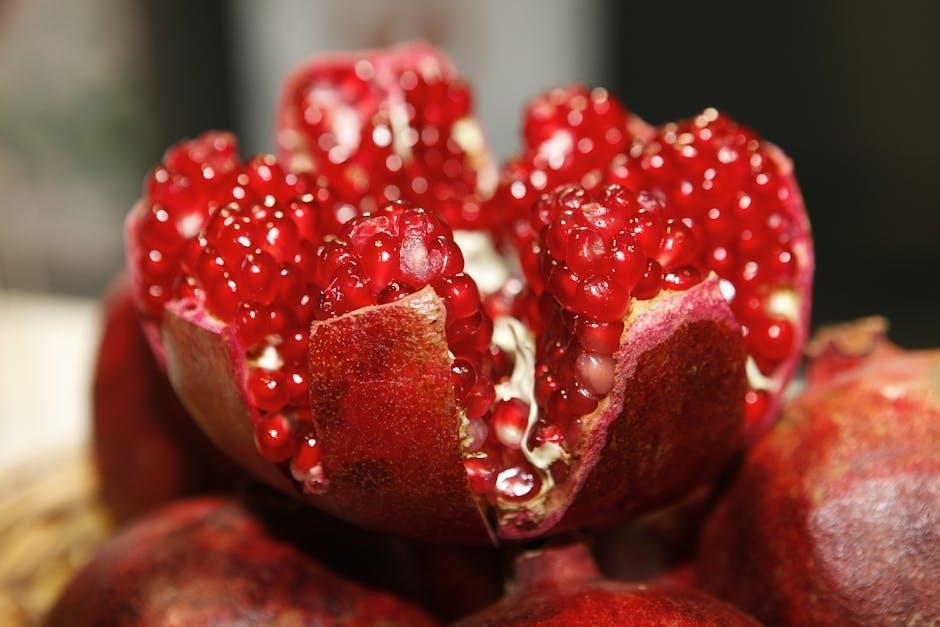
Common Mistakes to Avoid
Avoid relying heavily on processed foods and ensure adequate nutrition by checking labels for hidden animal products and consulting a plant-based diet guide for balanced eating.
Overconsumption of Processed Foods
One common mistake when adopting a plant-based diet is overrelying on processed foods, which can be high in unhealthy ingredients like added sugars, sodium, and artificial additives. While some processed foods may be vegan, they are often stripped of nutrients and can hinder the benefits of a whole-food plant-based diet. Examples include vegan snacks, meat substitutes, and ready-to-eat meals that may contain hidden animal-derived ingredients or excessive preservatives.
To avoid this, focus on whole, minimally processed foods like fruits, vegetables, whole grains, and legumes. Use your plant-based diet food list PDF to guide healthier choices and ensure you’re nourishing your body with nutrient-dense options. Always check labels and opt for organic, locally sourced products when possible to support sustainability and your health.
Nutritional Deficiencies to Watch For
A plant-based diet can sometimes lead to nutritional deficiencies if not well-planned. Key nutrients to monitor include vitamin B12, omega-3 fatty acids, iron, calcium, and zinc. Plant-based sources for these nutrients may not be as bioavailable or abundant as animal-derived sources. For example, vitamin B12 is absent in plant foods and requires supplementation or fortified products. Iron from plants has lower absorption rates compared to meat, so pairing iron-rich foods with vitamin C can help. Regularly checking nutrient levels and consulting a healthcare professional or dietitian is recommended to ensure a balanced intake;
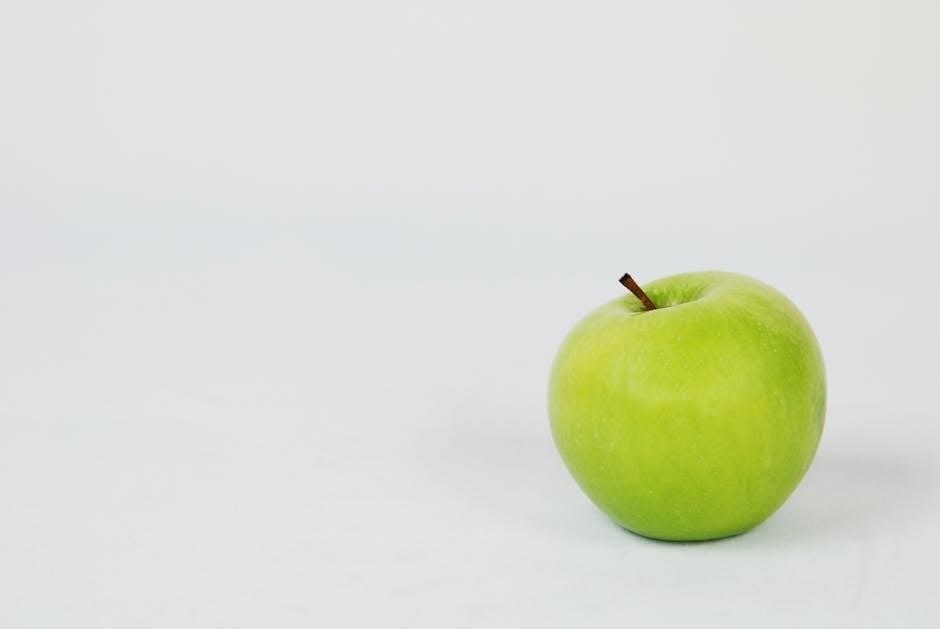
Adopting a plant-based diet offers numerous health and environmental benefits. This guide provides a comprehensive PDF list to help you plan and maintain a balanced, sustainable lifestyle.
Final Thoughts on Adopting a Plant-Based Diet
Embracing a plant-based diet is a powerful step toward improving health, reducing environmental impact, and promoting sustainability. With the right tools, like a downloadable food list PDF, transitioning to a balanced lifestyle becomes easier. Focus on incorporating whole, minimally processed foods, and explore creative meal ideas to keep your diet engaging. Avoid common mistakes like overconsumption of processed foods and ensure adequate nutrition by planning meals thoughtfully. By committing to this journey, you can enjoy long-term benefits for both your well-being and the planet. Start your transformation today with confidence and the support of this comprehensive guide.
Resources for Further Learning
For deeper exploration, check out guides like The Plant-Based Eatwell Guide and the National Kidney Foundation’s resources on plant-based diets. Downloadable PDFs, such as the Whole Food Plant-Based Diet Grocery List, offer practical tools for meal planning. Websites like Food for Life and medical research platforms provide evidence-based insights and meal ideas. Explore books, webinars, and community forums dedicated to plant-based living. These resources will enhance your understanding and support your journey toward a healthier, sustainable lifestyle.
